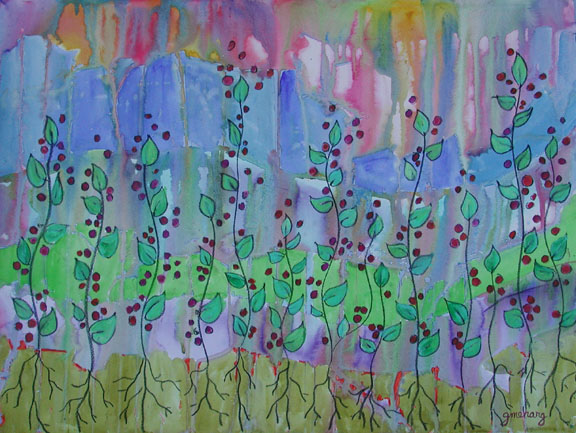People from the Glasgow Prophetic Centre were offering “prophetic words” at David’s Tent: An Adventure in Worship, a 72 hour worship festival I went to in August. I signed up for a 15 minute slot.
I am “prophetic” with a very small p. Prophecy, as Paul writes, is a spiritual gift, a little-understood one, though not one to be lightly dismissed, lest we miss surprising blessings. In my case (small p, remember) I often have an accurate intuitive knowledge of what is going to happen in my own life, or the lives of people I care about. It’s a love-gift: providing a little extra time to prepare for adversity, as well as a certainty and reassurance about astonishing and unlikely things that are going to happen. This “prophetic” knowledge, in my case, allows for a lot less worry and a lot more carefreeness.
However, if I took my small measure of supernatural prophetic gifting as the norm, I would be foolish indeed. There are people with great prophetic gifts. Though I don’t understand exactly how these work, they are, again, love gifts, a way for God to tell people something they would never have guessed on their own. They are words of encouragement, edification, and sometimes, warning.
For instance, Patricia Bootsma of the Toronto Airport Fellowship on a visit to Oxford, saw me, asked me if I had daughters, and said she had a word for my older daughter: Satan had brought things against her, but that she would overcome and become a leader in God’s kingdom. The prophecy filled Zoe with confidence. She hadn’t done well in her mocks, but excelled in her year 12 exams, getting 100% in RE, and an offer from Cambridge University in 2013, (though she reapplied to Oxford University in 2014, and is going there next month).
However, Emma Stark of the Glasgow Prophetic Centre had a prophecy not for Zoe, but for me.
It was the absolutely most startling experience I’ve had in many years of chasing the wild goose of the Holy Spirit. My most astonishing experience of the prophetic.
Emma asked my first name, that is all. She instantly started speaking, “seeing” things, things astonishing in their accuracy.
I turned my iPhone on, and recorded the session: 12 minutes. Here’s my transcription.
“Satan has demanded to sift you for a season, but he didn’t realise that he was actually asking for a promotion because you have been found as someone who can be trusted through the previous season.
And the Lord says, “I am about to promote you like you have never been promoted before. I am about you to lift you up into a place because you have been found as someone who can be trusted through the previous season.
And the Lord does not say this to everybody, but he says it to you. “Daughter, in the testing and in the hard places, you have been found trustworthy. I trust you. I trust you. I trust you.”
It’s time to stop cursing yourself for decisions taken in the past. I forgive you and I let you off the hook. It’s time to let these things go, for I do not view them as you view them.
I do not view you as the Sarah who laughs when the angels come. I speak of you as the Sarah of the New Testament. I speak of you as of my faithful ones, and I speak of you as one of my righteous ones. I speak of you as one of my ones of integrity.
And in the mighty name of Jesus, (with hands on my back) I forcibly extract every toxic dart that was thrown into your back, and that criticised you and criticised your reputation, and all the toxicity that came into your flesh and even brought ill-health and insomnia, I utterly break that in the name of Jesus.
(Interestingly, on all except for a handful nights since then, I have slept soundly.)
(Then, placing hands on head) I speak alignment to your sleep patterns. I speak rest to your night. I speak alertness to your day. And I hear the Spirit of the Lord say, “Daughter, you will not even know yourself for I am coming in the night, and I am coming in the day, and I am re-aligning your cycles and your patterns and the Lord says to you, “Daughter there was a day where there was energy and joy and that day is coming back again. And there was a day when there was joy, and that day is coming back again.” And the Lord says, “There was a day when you rose and s. And you found a hop, skip and jump in your step, and that day is coming back to you.
“Daughter, this season is coming to an end, and it will not be like this. And daughter, you will not even recognise yourself in the coming days.”
And the Spirit says “Oh mighty mother, here I am going to give you spiritual children to steward, for I trust you as a mother to the many.”
* * *
And the Lord says, “I have even anointed your voice to speak, and I have even anointed you as a gifted communicator.
And the Lord says, “There is something that has been stolen and lost, and no platform has opened up to you. But the spirit of the Lord says, “I am now opening up a platform for communication in your life, and you are going to be heard, you are going to be heard, you are going to be heard.
And the Lord says, “For the gift I gave you is true. The gift of communication is right, and the Lord says, “You are a woman of truth and a woman of integrity.”
(I have a stack of certificates and prizes for debating, and had done much public speaking, but not for some years.
Interestingly, out of the blue, I was invited to be interviewed by Maria Rodrigues on Premier Radio’s Woman to Woman Show on the 18th Thursday, 20 days later. Listen here. Starts at 34.20).
* * *
(Then, just as when you are listening to God in writing, you have a first draft, and then get closer and hotter, she suddenly “saw” that I was a writer. Amazing.
She was listening to God, hearing, hearing accurately, speaking what she sensed God saying. An incredible experience to listen to. I imagine it’s as the prophets of old heard and wrote.)
So she continued, even more astonishingly,
“Daughter, I am touching your hands, for in this season, I have called you to write. I am going to bless your writing. I see you up, hidden away, and the Lord says you need to take some time to hide away and write for there is an anointing on you not just for communication that is spoken, but for communication that is written.
And the Lord says that he wants you to focus on your diary, because it needs shaking up. And there are some things that need to fall out of your diary, and there are some things that need to fall into your dairy, and the Lord says that one of the things that needs to fall into your diary is writing time and creative space. And there is a push on your diary and the Lord is being very clear with you: you are too busy; there is too much.
And the Lord says, “What you were anointed to do, communication, is being squeezed and squeezed and squeezed, and that’s why you feel in this permanent state of deep frustration. And the Lord says, “I want to take away that frustration that you have hidden deep within you, and the Lord says, ‘Bring your diary to me, and I am going to show you what you need to cut out and what you need to put in.’ There is a great permission from heaven to actually say “No.” I need to fulfil the call of God on my life, and not to plug every gap.”
And so I want you to hear from your heavenly father that He is changing the season and giving you the space to say “Actually this is important, and this is not important.”
Then Emma said, “I am going to put my hands on your hands. I take off writer’s block right now, a stuckness in the gift.
And I bless a new level of creativity in you.
And I am watching angels (if you are okay with that) open the top of your head, and they are just taking out fluff. It looks like fluff! It looks like stuck fluff in your head, wooliness, confusedness, and the Lord is releasing angels to pour glory into your brain.
And the Lord says, “No longer are you going to be in a season of confused thinking. No longer are you going to be in season of writer’s block. No longer are you going to be in a season where you don’t know how to take decisions. But the Lord says, “there was a day when you were able to think fast and take decisions and that the Lord says, “I am going to give you back the ability for fast-paced decision making and for creative thoughts to flow again.”
(I was in tears at the end of all this. Wouldn’t you be?
The moment she said “There are some things that need to fall out of your diary I knew what she meant.” I was going to a Christian activity on a weekday morning, which absorbed more than three hours of my time, but did not inspire or energize me, and, in fact, left me mentally, physically and spiritually and emotionally drained. Increasingly, my heart sunk at the thought of going. A fundamental rule of simplifying your life and managing time well is: Get out of things you dread. However, like many people who’ve moved a lot, I do not easily consider changing–homes, cities, careers, churches or small groups, but in a flash, as she spoke, I felt God release me to step out of that group, to focus on writing, and to trust him to fill the void with something far better of his choosing.
In the Old Testament God spoke through angels, asses–and prophets too. I am so glad he still does so today).
Emma continued, “And I am watching as anointing pours into your head a new colour come all over your body. And the Lord says, “I am even going to change what colours you like, and I am going to add vibrancy. I feel like colours have become stuck, even creatively. It’s actually time for a redecorating of your house because your house has got tired.” And the Lord says, “I am going to enable you financially to start to redecorate the house because the house needs it, and you need it, and more importantly, the colours that God wants to paint around about you in this season, and inside you, are completely different to what they were in the last season, because different colours mean different anointings.”
Emma was accompanied by Leah from Marketplace ministries, who said, “He’s giving you a red rose, and he’s inviting you to dance.” I see healing in deep places of your heart. All the things that are rising up for you, his hand is in that. He just wants you to hand them to him, and to invite him into those things, and really give him your heart over those matters.
He’s going to release dreams of the night and waking visions. He’s releasing a refreshing of your hopes and dreams, the desires of your heart. Your lost hopes and dreams that have been stolen from you, he is restoring those for you, he is bringing them back. So begin to notice and have hope. I break disappointment and despondency off you, and I release a new hope for you, because he’s coming with promises.
I saw a lot of flowers, a garden, with so much nurture and nourishment coming from you.”
And how great the love the Father has for us that he should provide such a specific and loving intervention through a stranger, rescuing me from a time-consuming and draining commitment that I wasn’t enjoying but hadn’t considered leaving.
That he should reassure me about my writing, and anoint me through a stranger, whom I did not even mention my writing to.
Oh how he loves me.
Love is a hurricane
I am a tree
Bending beneath the weight
Of his wind and mercy!
* * *
I have heard about Sozo Healing Ministry from Bill Johnson’s Bethel Church in Redding California, and since David’s Tent was offering 90 minutes Sozo slots, Roy and I signed up.
I brought up three worries, then sat in silence with the two prayer ministers to listen to God speak about them. God speaks through words or images. In this case, interestingly for someone as verbal as I am, He spoke in images.
I asked prayer about a memoir that is taking rather long to finish, and saw an image of snowy-covered mountains. I remembered the words from Psalm 121, “I lift up my eyes to the mountains/where does my help come from? /My help comes from the Lord,/ The Maker of heaven and earth.”
There is help in writing it, I remembered again, from the Lord, the maker of heaven and earth.
I asked for prayer for my battle with health. I have lost about 24 pounds over the last two years, but still use food as a crutch—when I find it hard to settle down to writing, when stressed, tired, bored, despondent, discouraged (though far less than I used to).
I had a powerful image of living water flowing, always flowing. There is always grace to help me in my time of need. I just need to avail myself of it, go to the waterfall of grace, and ask God for help rather than turn to chocolate for the quick blood sugar boost that will make me more resilient to long hours of work, or the sadnesses of life.
(But, chocolate is pretty amazing, let it be said.)
Interestingly, I’ve asked for prayer for both these things here and here. And I have progressed in each, though am not yet “victorious.” Sometimes that is how change happens: the “victorious limp” in Brennan Manning’s phrase.
* * *
David’s Tent was a three day worship festival. In Celebration of Discipline, Richard Foster suggests choosing prayer as a recreational activity. And when I need refreshment, and I am alone, or the rest of the family is busy, I often do.
At David’s Tent, worship was a recreational activity. And perhaps it is the purest recreation there is, the purest self-forgetfulness, forgetting oneself in worshipping God, three days spent worshipping God, an alabaster jar of precious time and energy and potential income smashed on Jesus’ feet. And the tent was filled with the fragrance of the perfume.
* * *
There were thousands of young people worshipping God. It bodes well for the future of Britain.
The musicians were largely from America; many of the audience came from Scandinavia and Germany, Holland but mainly from the United Kingdom, England, Wales and Scotland.
Several new expressions of Christianity have spread out from England—Anglicanism, of course, Presbyterianism, Methodism, the Baptists, the Quakers, you name it.
Britain is uniquely placed for the re-evangelisation of the world. Her former colonies, America, Canada, Australia, New Zealand, and those in Asia and Africa view her with affection. And Europe views the hobbits from Britain with bemused affection.
Perhaps a new wave of revival will spread out again from these shores, a new wave of love, surrender, worship, and an experience of the fullness of the Spirit.
What is revival? A massive renewed love for God and enjoyment of his presence, a commitment to him that thousands experience in common.
I hear the sounds of distant thunder. I hear the sounds of coming rain. I hear revival blowing in the wind. I smell it.
Maranatha. Come, Lord Jesus!









 Joash shooting the arrow of deliverance. William Dyce
Joash shooting the arrow of deliverance. William Dyce






